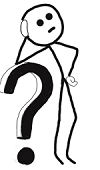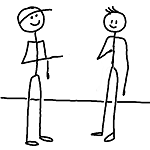Whose
l'interrogativo italiano di chi? viene reso in inglese con whose.

Whose are the scarves in the kitchen? [tooltip]di chi sono le sciarpe in cucina?[/tooltip]
The plain one is mine, the striped one is yours [tooltip]quella a tinta unita è la mia, quella a righe è tua[/tooltip]
Fa riferimento a persone indicando a chi appartiene l'oggetto cui si fa riferimento.
In presenza di un dimostrativo whose è usato come pronome non è immediatamente seguito da un sostantivo.
Whose is that book? It's Tom's [tooltip]Di chi è quel libro? è di Tom[/tooltip]
In presenza di un dimostrativo [this - that - these - those] whose è usato come aggettivo, seguito da un nome ( comune di persona o di cosa ).
Whose book is that? It's Tom's [tooltip]Di chi è quel libro? è di Tom[/tooltip]
Quando whose è usato come aggettivo il sostantivo può fungere da soggetto o da complemento della proposizione interrogativa, quando il sostantivo funge da soggetto della domanda la struttura verbale è quella delle frasi affermative:
Whose car has been stolen? John's car has been stolen [tooltip]Di chi è la macchina che è stata rubata? L'auto di John è stata rubata[/tooltip]
Whose watch has been found? Susan's watch has been found [tooltip]Di chi è l'orologio che è stato trovato? l'orologio di Susan è stato trovato[/tooltip]

Quando il sostantivo funge da complemento della domanda la struttura verbale è quella delle frasi interrogative:
Whose car did you borrow? I borrowed John's car [tooltip]Di chi è l'auto che hai preso in prestito? Ho preso in prestito la macchina di John[/tooltip]
Whose watch did you find? I found Susan's watch [tooltip]Di chi era l'orologio che hai trovato? Ho trovato l'orologio di Susan[/tooltip]
Le forme (the) ... one / (the) ... ones sono usate per evitare la ripetizione di un sostantivo espresso in precedenza.
--- PER APPROFONDIRE L’ARGOMENTO ---
This is one of those cases where it is important to remember that possessive pronouns never take apostrophes, even though possessive nouns do.
“Who’s” always means only “who is,” or “who has,”
Who’s that guy with the droopy mustache? Who’s been eating my porridge?
“Whose” is the possessive form of “who” and is used as follows: whose dirty socks are these on the breakfast table?